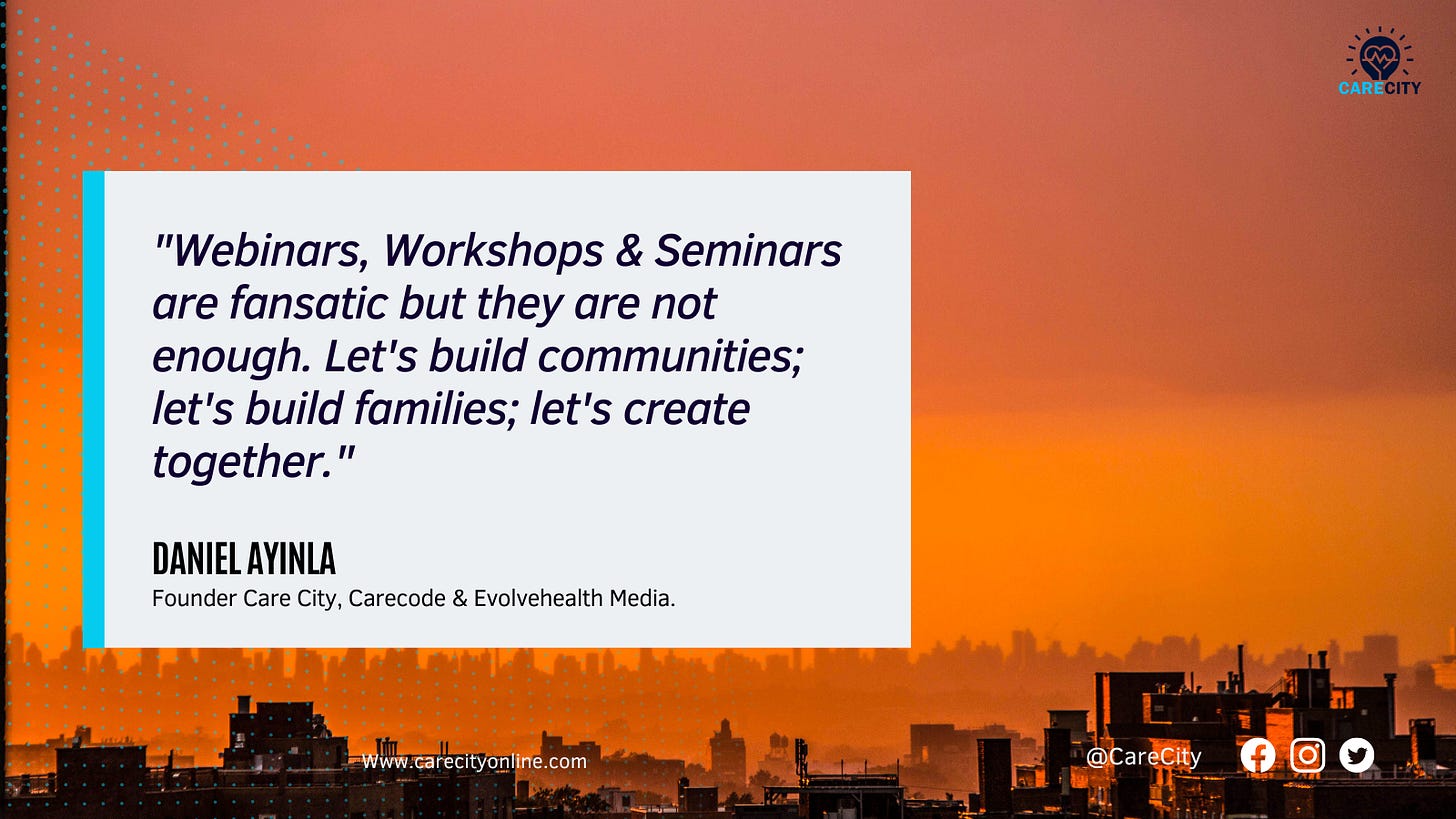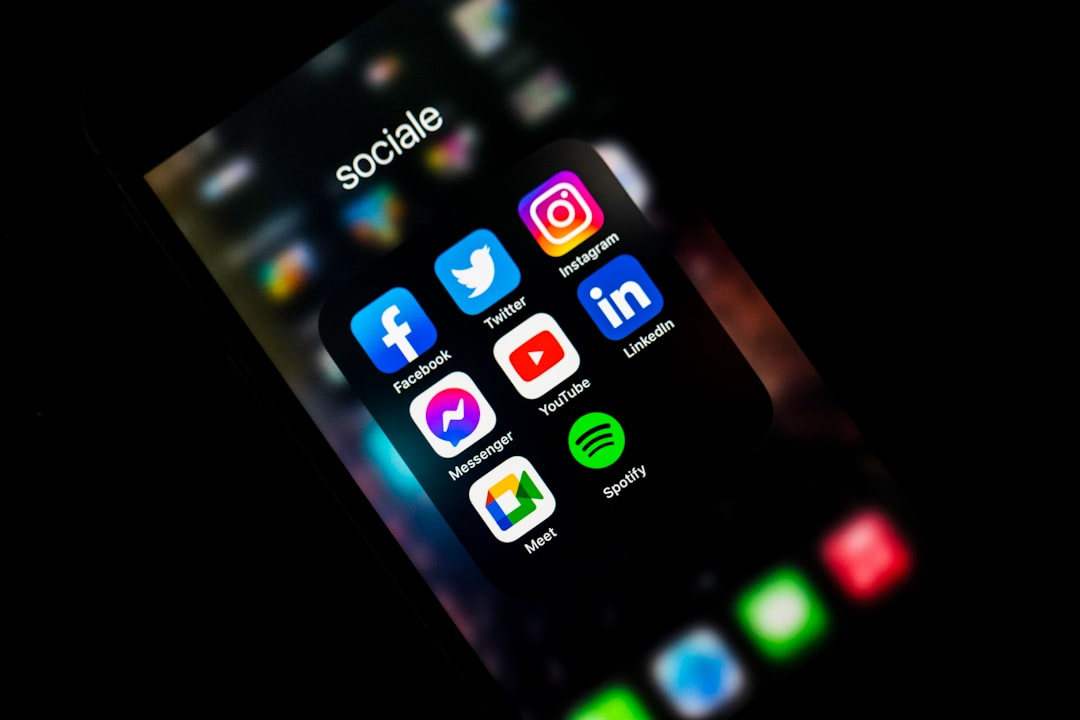
The Art & Science Of Building Brand Communities
A brand is a voice and a product is a souvenir.
Lisa Gansky
Companies, organizations, and brands that place a premium on building a deep sense of community around their ideas, services, and products are intensely loved and respected by their users, customers, consumers, and audience.
You see, people want to interact with companies and brands that are “organic.”
When businesses neglect the community [organic] side of their business, they gradually lose control over their users, customers, and consumers. And if nothing is done about it, the business suffers too.
Take a quick look at the great brands around us today.
They have perfected the “art of building community” around their ideas, products, and services.
So, people don’t just see these great brands selling something to them.
They see these brands as communities and families to learn from and grow in.
That’s what you must do for the brand you are building and nurturing.
And healthcare brands are way behind when it comes to building a sense of community around their ideas, services, and products.
It may be partly due to the conservative nature of healthcare.
But it’s all changing with the advent of “Digital Health”.
Digital health is bringing a new culture into the healthcare ecosystem.
People are beginning to understand that they can have a say in their care.
Digital health is making it possible.
And then there is the idea of “Decentralized Healthcare,” which sounds almost too good to be true.
Healthcare brands that really want to make an impact in today’s technologically advanced society must know that the only way they can make true and lasting impact is if they understand and embrace the friendly concept of community building.
It’s the cheapest and purest form of marketing you can invest in.
It takes some time to build brand communities that people trust and love. But in the long run, the benefits are enormous.
Briefly, I will share with you some practical tips on how you can build a deep sense of community around your brand, especially if you are a starting healthrepreneur.
How Do You Build A Brand Community?
6 Practical Steps
Before we lurch forward, let’s briefly define and describe what a brand community is.
Simply put; a brand community is made up of people who have fallen madly in love with your brand. They are practically in a romantic relationship with your brand.
They are emotionally invested in and attached to your brand; these people will read and digest your content as if it were their daily bread; they will buy your products and use your services; they will tell friends and colleagues about your brand without expecting anything in return! Isn’t that awesome?
Brand communities are more than just social media followers and subscribers. Though having social follows is a part of the whole process.
It is from these social follows that you can attract those who have sincere interests in what you are doing and gradually begin to convert them into “family members.”
One mega brand that does this so well is APPLE!
A technology company loved by many. Even those who can’t afford to buy their products still love and respect the brand.
It’s true, Apple spends a lot of money on their marketing. Besides that, they also place a lot of premium on building their brand community.
It takes 20 years to build a reputation and five minutes to ruin it. If you think about that, you’ll do things differently.
Warren Buffett
Here Are 6 Practical Steps
- Master Your Vision As A Company or Brand
- Bring The Right Team Together
- Understand What “True Marketing” Is
- Invest In Social Media
- Communication Is The Pillar
- The Creative Advantage
Let’s talk a little bit about each point…
Master Your Vision As A Company or Brand

Brand communities are potent business tools. If utilized well, your brand or company will enjoy significant all-around growth.
For your brand, company, or start-up to tap into the power of communities, you must master your company’s vision.
Your vision is your sight into the future.
Don’t just start a company because you feel like it or because others are doing it.
It always is not a very exciting idea, especially when you encounter hurdles and obstacles. It takes more than just excitement. You must be fiercely dedicated, but to what? to your vision as a company.
One of the many reasons why many young entrepreneurs fall by the wayside is simply because they have not mastered the vision of their companies, ideas, or start-ups.
And it’s even more difficult in the healthcare ecosystem, where things are extremely closed-ended and conservative.
You must put in some extra effort, unlike if you were in finance or software. In those ecosystems, there are many support communities and templates, but in healthcare, things are a bit different.
And the healthcare ecosystem doesn’t really favour solopreneurs, you have got to have some real big backup, vast experience, and a robust network to break through.
Notwithstanding, that doesn’t mean you shouldn’t venture.
Bring The Right Team Together

You can’t do it all alone. You need the ideas, expertise and experience and exposure of others to bring your ideas to reality.
It doesn’t matter how smart, intelligent or connected you are. Without the right people around you, working and labouring with you, you won’t go far enough.
For starters in the game of entrepreneurship [healthcare entrepreneurship], they must understand the importance of putting a good team together. Not a perfect one, but one ready to work with you in bringing the vision to reality.
This is where many entrepreneurs suffer. Especially in healthcare, where the concept of healthcare entrepreneurship is still pretty new.
What many think healthcare entrepreneurship is, is confined to the idea of owning a hospital, clinic or pharmacy.
It’s all changing though.
The digital era has started to change how we view healthcare entrepreneurship.
Health-tech companies and start-ups are gradually redefining what healthcare entrepreneurship is.
Understand What “True Marketing” Is

It’s important to understand what marketing is.
Marketing is more than selling and buying.
Marketing is about creating and delivering value [through your products, services and ideas] to a target market.
It’s about finding your customers, building relationships with them and offering them products, services and ideas that will help them.
Sales and advertising are just tiny parts of the vast world of marketing. But due to online culture, we have all come to see marketing through the limited lenses of sales and advertising.
Marketing is more about understanding society and how people interact with their environment — It’s psychology, communication and strategy all rolled into one organized lump.
Marketing is discovering what people want, and packaging and making offers attractive enough for them to purchase these products that will HELP THEM.
The population thinks marketing is synonymous with manipulation.
When they see a ‘marketer’ from afar coming to them, what comes to their minds is: “this fellow wants to push down my throat what I don’t need.” 🙁
Philip Kotler.
What Marketing Is Not
- Marketing is not promotions.
- Marketing is not advertising.
- Marketing is not selling.
- Marketing is not [exactly] branding.
All these are elements or parts of marketing but they do not define marketing in its entirety.
Thank you for reading Unbounded By Ayinla Daniel. This post is public so feel free to share it.
Invest In Social Media

The world is a BIG social village. A lot of advertising and marketing depends wholly on social media channels.
Twenty years ago, no one would have imagined that companies will be spending millions of dollars on Facebook and Twitter ads.
Social media is a significant aspect of brand building and marketing.
Your customers, consumers and users are all social beings. They are all over the internet looking for information. They are on Facebook, Instagram and Twitter interacting with people.
Your company or brand must break into the social cycle and intercept them.
If you want to just focus on any other form of marketing that does not involve the internet and social media channels, I do not think you will last a week.
No business or company survives in this century without social media.
So, you must invest in social media tools. Employ experts and brains who know how to use social media to drive brand growth.
The communities we are building around your brand are made up of highly social and intelligent beings.
With social media, you can inform, educate, entertain and inspire your community. It’s all part of the bigger picture.
How Healthcare Media Is Changing
Healthcare media is changing in this 21st century. It has started to reflect the consumer culture other industries portray.
Consumer culture places more than 70% of purchasing power in the hands of the users, consumers and customers.
For too long, in the healthcare ecosystem, the power has been in the hands of the healthcare providers, payers and employees and BIG HMOs.
It’s all changing. And healthcare media has a very big role to play here.
It is healthcare media that will inform, instruct, educate and motivate the population.
This is why we must advocate for better healthcare media that genuinely wants to help people by giving them the right information.
The consumer culture revolution in the healthcare ecosystem will bring in a system where consumers and users can choose from a wide variety of healthcare services and products available online, instead of having services and products that they know little to nothing about pushed down their throats by employers and BIG HMO’s [who are more concerned about making profits].
Healthcare marketing is becoming a force to reckon with in the marketing galaxy.
“A study by Think with Google shows that 84% of patients use offline and online sources for hospital research. In another study, 66% of internet users check the internet for information about medical problems or diseases.”
Mammoth healthcare organizations, like Johnsons & Johnsons and Pfizer, spend billions of dollars yearly on marketing. And most of their marketing efforts and resources are directed online [digital marketing, social media campaigns, online conferences, etc].
So, how is healthcare media changing?
- The internet plays a crucial role.
- Digital health and decentralized healthcare will be built on digital infrastructures and online platforms.
- Companies, brands and start-ups that will dominate the next world of healthcare consumerism must build strong healthcare media structures and systems.
- Healthcare marketing resources will see a large portion spent on online tools, personnel and structures.
Communication Is The Pillar
Marketing is 85% communication. The rest is strategy and research.
Marketing endeavours are mainly centred around communicating [and implementing] research findings, strategies, information and relevant content.
This is why copywriters and digital marketers are becoming the internet musketeers of this online age.
Your brand needs to develop the right communication channel if it wants to build a strong brand community.
The people who make up your community want to interact with you. They want to learn, they want to be inspired and motivated. This is what you must do with your communications channels and strategies.
Companies, brands and start-ups need to invest in their communications channels. Their websites, social media pages, etc.
In the last few years, we have started to see healthcare brands take communications seriously.
They are now investing in building better websites, setting up social media pages and getting intentional about interacting with their clients, consumers and users.
The competition in the healthcare ecosystem is becoming fierce. And one of the most potent advantages smart healthcare companies or brands can leverage is building strong brand communities around their products, services and ideas.
The Creative Advantage

This is one advantage neo-healthcare brands may have over older healthcare brands who have refused to evolve.
The ability to mix creativity into the process of bringing healthcare products and services to consumers and users is one skill brands must master when it comes to building a brand community.
Besides, brand communities exist because companies have services and products that can make the lives of people better. Without products and services, there is no need to build a brand community in the first place.
In building brand communities around your products, ideas and services you must be creative.
People want to be stimulated, they want to be entertained and creativity if used well can entertain and stimulate.
A “Brand Community” Is Not “Brand Awareness”!
I will leave you with that thought.
Building a brand community is not the same as brand awareness.
These two concepts may look identical, but they are entirely different.
Brand awareness is what you do to tell people about your brand. It’s part of the whole process of building a brand community.
The big issue here is that most healthcare brands stop at just creating awareness. Creating awareness is not enough.
You must take big steps forward and start harvesting those who have been exposed to your brand to become community members. It takes some time. It’s not magic, but in the long run, it helps your brand survive out there.
You can achieve brand awareness by spending a lot on advertising and marketing. But when it comes to building a sense of community around your brand, it’s more organic than paid.
The fact that your ads and marketing reached a thousand people in one week doesn’t mean all those reached will automatically become family members.
You have got to go after them. Interact with them. Get genuinely interested in helping them.
This is where we must change healthcare marketing.
It shouldn’t just be about selling people drugs or providing them with medical services. It should be more about helping them. How can we help them? Even if they don’t buy our products and use our services.
How can our brand touch the lives of people who have never bought any of our products or used our service? This is community brand building.
“Your brand is way bigger than its services, products, and ideas—your brand is what it can do to help make the lives of people better.”





